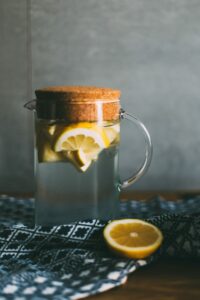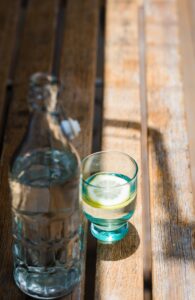How and why to stay hydrated in the summer
Thousands of people end up going to the hospital every summer due to dehydration, the term for what occurs when you use or lose more fluid than you take in.

In the summer, especially with more time spent outdoors and when exercising the heat can drain us of the water we need, and we sometimes forget the importance of restoring that supply.
The average adult human body is made up of 60% water and all our bodily functions require water in some way, making it crucial to remain hydrated. Further, eating foods with high water content can improve your immune system. Being dehydrated can also negatively affect your mental health by decreasing your concentration and creating a sluggish feeling that can last.
While not the only drink helping us stay hydrated, water is cheaper, more readily available and generally healthier than other beverages.
Older adults, in particular, are more susceptible to becoming dehydrated for several reasons.
These include:
- A decrease in total body fluid
- Lowered thirst response
- Decreased kidney function
- Age-related health conditions and medications
Therefore, older adults must try their best to stay hydrated and be aware of signs of dehydration.
Dehydration symptoms:
In order to tell if you’re dehydrated, watch for these symptoms:
- Headache
- Dizziness
- Nausea
- Fatigue
- Confusion
- Extreme thirst
- Less frequent urination/dark-colored urine
- Increased body temperature
- Weakness and muscle cramps
While simply drinking water can alleviate these symptoms, it can still be difficult at times to remember to replenish your water supply.
Here are five tips and tricks to stay hydrated during the summer:
- Keep water around you constantly. Carry a reusable water bottle with you throughout the day to inspire you to sip your way to proper hydration this summer. It is often recommended the average adult should be consuming 8 glasses (64 ounces) of water each day.
- Do you find water bland? Adding a lemon or lime slice can jazz up the taste, as can adding fruit chunks to make flavor-infused water. Fruit and herbs can both make it more appealing as well as nutritious.
- Keep track of urine color for an easy way to understand whether you are hydrating your body well. Your urine should appear pale-yellow when you are drinking enough water; if it is dark yellow and concentrated, your body needs more.
- Avoid being outside when the sun is at the highest point in the sky. The time spans roughly from 10a.m. to 4 p.m. when the sun’s rays are the most severe on skin. High temperatures cause us to sweat out precious fluids we need.
- Eat your way to hydration! Along with the rich nutrients found in fruit, they are also a great source of water. Citrus fruits such as oranges, lemons, and limes are full of water along with watermelon, cantaloupe, apples, and fresh berries. In addition to eating citrus fruits and other water-rich foods, EatingWell has unique recipes that incorporate those hydrating foods. Here are just some of their recipes:
- Watermelon and goat cheese salad with citrus vinaigrette
- Tomato, onion, and cucumber salad
- Watermelon sorbet
- Raspberry, avocado and mango salad
- Strawberry bruschetta

When trying out some of these recipes and consuming different foods, it is important to remember each of the ingredients you are putting in your body. Director of Dining Services at SALMON Health and Retirement, Jason Wallin, states that “while consuming hydrating seasonal fruits and vegetables and adding fresh herbs and cucumbers to flavor water is great, drinking unflavored water throughout the day is still a big help for overall hydration.” At SALMON, “we take of our Residents by offering hydration stations on each campus.
“Preventing dehydration is always the best medicine. Early recognition of symptoms and taking steps to restore water loss in the body is essential. Everyone should check with their physician about the correct amount of water they should consume, as this may vary from person to person.”
Finally, many times people mistake thirst for hunger, so, before munching on a snack, drink a glass of water. No matter how busy you get, fitting in a sufficient amount every day can help keep your body working at its best and may even help prolong your life.




